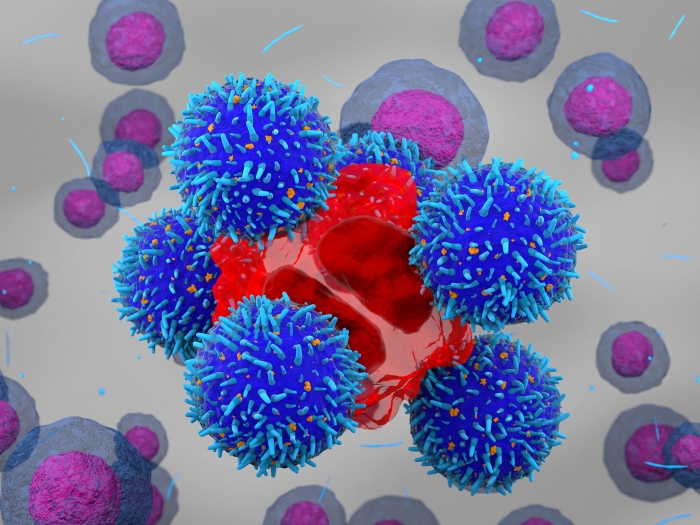Phase three trial results for only approved gene therapy for rare bleeding disorder reinforces lower bleeding rates, improved outcomes
12:00 PM
Author |

The first and only approved gene therapy for adults with bleeding disorder hemophilia B remained safe and effective two years after treatment, according to new data from a Michigan Medicine-led trial.
The findings, which appear in the New England Journal of Medicine, reinforce previous trial results showing that the treatment is safe, lowers bleeding rates, and allows patients to stop using other therapies to manage the condition.
The gene therapy studied, Hemgenix, also boosted the levels of factor IX (FIX) — the protein missing in hemophilia B that prevents blood from clotting properly to control bleeding. Most patients with the hereditary condition need lifelong, continuous treatment to replace the deficient clotting factor to prevent life-threatening bleeding episodes.
“This is a transformative treatment for patients with hemophilia B who typically require one to two intravenous infusions per week from birth through the rest of their life,” said trial lead scientist Steven Pipe, M.D., professor of pediatrics and pathology at the U-M Medical School and hematologist-oncologist at U-M Health C.S. Mott Children’s Hospital. “This new gene therapy gives hope to pediatric patients that they can one day have an option that eliminates reliance on regular IV infusions and allows them to enjoy a freer, less restricted lifestyle.”
The phase three clinical results stem from the pivotal Mott-led HOPE-B trial, a multicenter study conducted at 33 sites in the United States and Europe that includes data from 2018 to 2021. Researchers will continue to follow patients through 2026.
The safety and effectiveness of Hemgenix were evaluated in two studies of 57 adult men ages 18 to 75 with severe or moderately severe hemophilia B. Scientists established effectiveness based on consistent decreases in the participants’ bleeding rates.
The new findings support the U.S. Food and Drug Administration’s recent approval of Hemgenix for adult hemophilia B patients who are on a preventive treatment regimen or have had life-threatening hemorrhage or repeated, serious spontaneous bleeding episodes.
This new gene therapy gives hope to pediatric patients that they can one day have an option that eliminates reliance on regular IV infusions and allows them to enjoy a freer, less restricted lifestyle.” Steven Pipe, M.D.
Hemophilia B affects about one in 40,000 people and predominantly men. Symptoms can include excessive bleeding from cuts, an injury, surgery, or dental work. Prolonged bleeding episodes can lead to serious complications, such as uncontrolled bleeding that can harm joints, muscles or internal organs, including the brain.
Hemgenix is a one-time outpatient therapy given as a single dose by IV infusion. It consists of a viral vector – a tool designed to transport genetic material into cells – that carries the gene for the blood clotting protein missing in hemophilia patients. The gene is expressed in the liver to produce the protein to limit bleeding episodes.
The most common adverse reactions associated with Hemgenix included liver enzyme elevations, headache, mild infusion-related reactions and flu-like symptoms.
Patients should be monitored for adverse infusion reactions and liver enzyme elevations in their blood.
Disclosures: Pipe has served as a paid consultant to several companies developing gene therapies for hemophilia B, including CSL Behring and uniQure, which provided funding for this trial.
Study cited: “Gene therapy with etranacogene dezaparvovec for hemophilia B,” New England Journal of Medicine. DOI: 10.1056/NEJMoa2211644

Explore a variety of health care news & stories by visiting the Health Lab home page for more articles.

Department of Communication at Michigan Medicine
Want top health & research news weekly? Sign up for Health Lab’s newsletters today!





